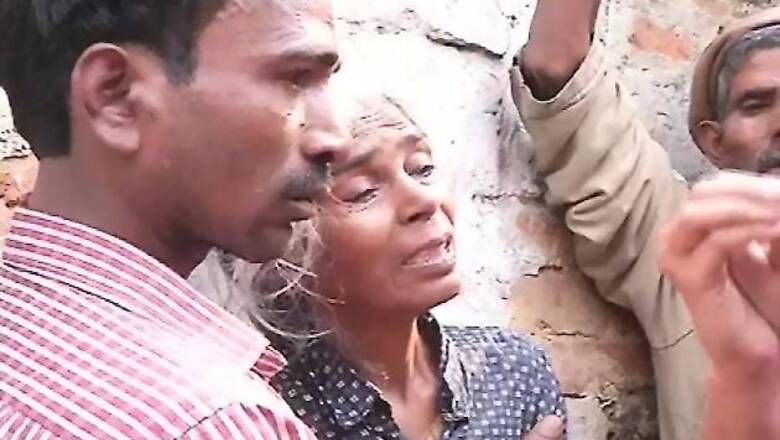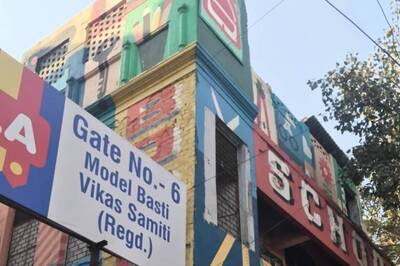
views
New Delhi: Some of Ram Singh's neighbours grimaced with disgust as they remembered a man they described as a menace, who was violent, drank heavily and used to harass women by peeking at them as they undressed. The alleged ringleader in a gangrape and murder case that sparked outrage across India, Singh was found dead in his prison cell on Monday, once again putting the Delhi slum he used to call home in an unwanted spotlight.
"People had forgotten about this whole thing. Now all of sudden, this idiot hangs himself and look how this is in focus again," said an autorickshaw driver in the cramped and grubby Ravidass Camp slum. "He won't let us live in peace. Whatever peace we were slowly getting has now gone again."
Singh was accused along with four other men and a juvenile of raping and fatally wounding a 23-year-old woman on a moving bus in December. All six pleaded not guilty although police say Singh had confessed to the crime under interrogation. Authorities in Delhi's Tihar jail said Singh hanged himself before dawn. His father rejected that explanation, saying he believed his son was murdered.
"He confessed about his mistake, then why would he commit suicide? He was prepared for any punishment the government would have given him," Mange Lal Singh told reporters in his home in the slum. "Ram Singh did not commit suicide, he was murdered. He was first murdered and then his clothes were torn off to hang his corpse in his cell," he said.
Legal experts said Singh's death does not undermine the prosecution's case against the other accused, which was largely based on DNA evidence and the testimony of the rape victim before she died and her friend. "There will be no impact on the trial. This is a case of gang rape where all are held equally responsible, you can't say one is more to blame than the other," said Rebecca Mammen John, a Supreme Court lawyer who has worked on many rape cases.
Ram Singh, 34, and his brother Mukesh, who was also accused in the case, were originally from Rajasthan. They migrated to Delhi in search of work in the late 1990s. Ram Singh found work as a bus driver, a job he stuck with even after an accident in 2009 that fractured his right arm so badly that doctors had to insert a rod to support it.
He later appeared on a reality TV show in a compensation dispute with a bus owner, who in turn accused Singh of "drunken, negligent and rash driving". In the show, the moustachioed, slightly-built man was seen walking stiffly and holding his right arm at an awkward angle. Singh and three of the other accused lived in a poor pocket in the otherwise largely middle-class neighbourhood of RK Puram, whose tree-lined boulevards contrast with the narrow lanes and open sewers of their slum.
Menace
Residents say Singh, a heavy drinker with a violent temper, was a menace to an otherwise peaceful neighbourhood. They said they remember an elderly woman confronting Singh about why he was always drunk. He is said to have replied, "Let me have my way. I will be world famous like this one day."
One neighbour, 19-year-old Priya, remembers Singh as a "disgusting" man. "Sometimes, while we were changing clothes or bathing, he would peep into our house. When confronted, he would be very rude and say it's his right to stand anywhere."
Singh eloped with a neighbour, a married mother of three, more than a decade ago, residents say. She died in 2008 and Singh eventually came back to the slum. Although he had few friends, one slum resident said Singh was often seen with four people who were later to become his fellow accused in the gangrape case.
The police report used to charge the accused draws a picture of Singh as the ringleader of the group. On the night of December 16, the accused gathered at his house for dinner, where he hatched a plan of taking the bus out to look for a victim to rape. The police say they found him sitting in the blood-stained school bus, wearing a bloodied T-shirt, the morning after the crime. A DNA test revealed that the blood belonged to the rape victim, the report said.
After the attack, Singh tried to wipe the bus clean with the victims' clothes, then made a fire to burn the clothes and other evidence. Witnesses from the neighbourhood he lived in came to the fire to warm themselves, the report said. The case brought infamy to the Ravidass slum, residents say. "This has become famous for wrong reasons and has made our lives hell," said a local electrician, who declined to be named.




















Comments
0 comment